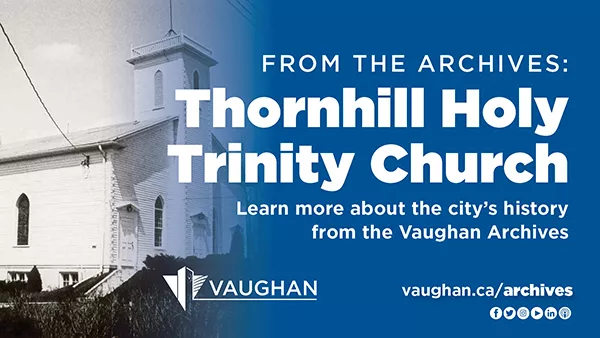From the archives: Thornhill Holy Trinity Church
From the traditional territories of the First Peoples of Turtle Island, to a farmland community, to a bustling city centre and everything in between – Vaughan's transformation is a story worth telling. As part of a monthly series, the City of Vaughan releases historical content from the Vaughan Archives, Office of the City Clerk. Citizens are encouraged to scroll through memory lane, learn about the city's past and explore the places, people and events that were pivotal to the development of the Vaughan we know today. This month, the City is highlighting the history of the Thornhill Holy Trinity Church.
The Holy Trinity Anglican Church is one of the oldest church buildings in the Greater Toronto Area. The construction of the building began in 1829 and was originally located just north of a golf course on Yonge Street. Picturesque with white clapboard siding and a square bell tower, it was officially opened in 1830 by John Strachan, who later became the Bishop of Toronto. The sermon lasted one and a half hours and replaced previous services held at the Cober Schoolhouse since 1815.
From the 1830’s to 1940’s, Thornhill experienced sustained growth and prosperity. During this time, a business centre developed on Yonge Street and stagecoaches travelled between Holland Landing and Toronto, making Thornhill an important station. Additionally, many of Thornhill’s old churches that still operate today, were built during this time.
Reverend George Mortimer was the first reverend at Thornhill Holy Trinity Church in 1835. He bought land beside the church to establish a church rectory. The home there was built to his specifications but was ultimately demolished many years ago.
In 1840, the church was enlarged and in 1860, another Anglican rectory was built down the street, this time at 8064 Yonge Street for Reverend E. H. Dewar, the third reverend.
William Parsons and his brother-in-law Benjamin Thorne (who lent his name to Thornhill) were both influential citizens who donated the land that the church was situated on and were involved in its construction. William also served as the first church warden. Other early supporters of the church included Captain John Arnold, James Young, Col. W.G. Cruikshank, Richard, Anthony and Southby Gapper and Edward O’Brien.
In 1928, Michael Wade helped to build the new parish hall for the Trinity Anglican Church, which was a red brick hall. Prior to this, there was no basement in the original church for Sunday School or other meetings, but when the church was moved and rebuilt on Brooke Street in 1950, additional features and spaces were created to better suit the needs of the community. A new parish hall was added in 1960. To date, in the church proper, the high pulpit and pews have been replaced, and the heating and lighting has been modernized.
ABOUT VAUGHAN ARCHIVES
Established in 1988, the City of Vaughan Archives is home to more than 600 collections, consisting of both City records and cultural records about Vaughan from 1860 to the present day. Records include, but are not limited to, the following:
- City business records with long-term legal and administrative value, such as Council meeting minutes, by-laws, assessment rolls, financial records, reports and official correspondence
- church, community and school records
- census records
- historical photographs
- land records
- historical maps, plans and aerial photographs
- newspapers
- personal papers of past residents and founding families, such as diaries, family histories, journals and letters
- records of local organizations both past and present
VIEW VAUGHAN'S ARCHIVES ONLINE!
As part of the City's COVID-19 response, Vaughan City Hall remains closed to the public – but the City's Archival Collection is on digital display for all to explore! The below galleries are now available in the City's online gallery on Flickr:
- From Township to City: The Evolution of Vaughan
- Featured Artists of Vaughan
- Historical Families of Vaughan
- Historical Figures: Lord Beaverbrook
- Historical Photography
- Recollections of Rural Vaughan
- The Mary Wood Collection
- The Way We Were: Representations of Vaughan's Past
- Vaughan Working Environments
- Vaughan Through the Ages: Medicine
- Vaughan Through the Ages: Music
- Vaughan Through the Ages: Sports and Recreation
- Stories of Remembrance
- Vaughan's Forgotten Heroes
- Early Churches of Vaughan
- Historical Schools of Vaughan
A personal Flickr account is not required to access the City's online gallery, which contains only a small selection of the full archives collection. If you are looking for a particular image, original file, primary source record or more, contact the Vaughan Archives by calling 905-832-2281 or emailing archives@vaughan.ca.
By managing and preserving both City and community records, the Enterprise Information Management Services team ensures that Vaughan's rich and varied history will continue to be available for future generations. Learn more at vaughan.ca/archives.

